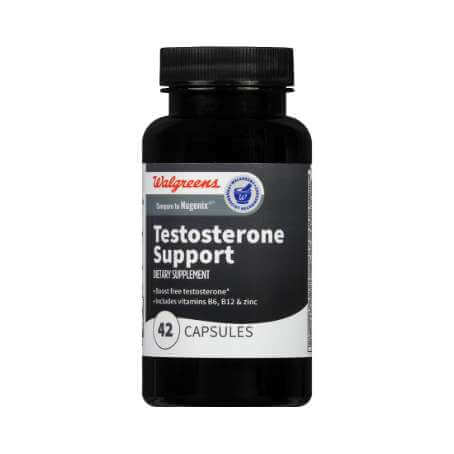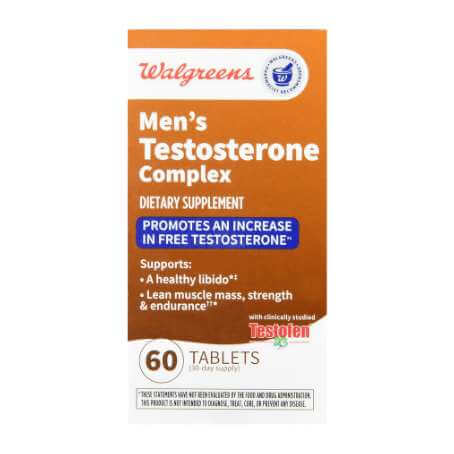Get ED Pills & Herpes Prescriptions Online | Walgreens
Sexual health
Take charge of your sexual health. Get answers to your questions, plus expert advice, in-store services and recommended solutions.
Available in select states*

What is an STI?
A sexually transmitted infection (STI) is a virus, bacteria, fungus or parasite people can get through sexual contact. They can be spread through any type of sexual activity involving your mouth, anus, vagina or penis. There are many different STIs. Common symptoms may include burning, itching or unusual discharge in your genital area. Many STIs have no symptoms or may only cause mild symptoms, so people can have an infection but not know it.
STIs spread easily, and if you’re sexually active, you might have (and pass on) an STI without realizing it. The Centers for Disease Control and Prevention (CDC) suggests getting regular STI tests if you’re sexually active.
What type of testing is available for STIs through Walgreens?
STI screenings test for various sexually transmitted infections. They may require a sample of urine, blood or saliva. You may want to get an STI screening if you think you’ve been exposed to an STI, if you are experiencing symptoms associated with an STI or as part of routine testing for your general health.
Walgreens Virtual Healthcare offers STI testing for chlamydia, gonorrhea, syphilis and trichomoniasis. If you would like to get tested for an STI, you can connect with a Walgreens Virtual Healthcare clinician. Click here to start a visit.
The clinician may place a lab order, and your STI testing can be performed at a Labcorp or Quest Diagnostics location convenient to you. Labcorp and Quest Diagnostics will charge a separate lab fee.
Walgreens Virtual Healthcare offers treatment for chlamydia and trichomoniasis only. If the results are negative, Walgreens Virtual Healthcare will release the results to you, send you applicable educational materials and recommend next steps. If your results are positive, a Walgreens Virtual Healthcare clinician will contact you to discuss next steps. You will need to set up an additional Walgreens Virtual Healthcare visit (at an additional cost) to receive STI treatment.
If you have questions about STI testing or would like to request a lab order for STI testing, click here to speak with a Walgreens Virtual Healthcare provider to learn more.

What is genital herpes?
Genital herpes is a common sexually transmitted infection (STI) caused by the herpes simplex virus (HSV) type 1 and HSV type 2 that may cause open sores or blisters in the genital area in some people. Genital herpes cannot be cured, but medications may ease symptoms and lower the risk of infecting others.
What are symptoms of genital herpes?
Many people who have genital herpes don’t notice signs or symptoms. It can be mistaken for a pimple or an ingrown hair. If you do experience symptoms, they start about 2 to 12 days after exposure to the virus and may include itching or small blisters around the genitals, anus or mouth, painful ulcers or scabs, painful urination among others. Some people experience flu-like symptoms during their first outbreak, such as fever, headaches and body aches.
What types of medications are available for genital herpes treatments?
Genital herpes cannot be cured, but medications may ease symptoms and lower the risk of infecting others. Your healthcare provider can prescribe antiviral medications.

What is erectile dysfunction (ED)?
Erectile dysfunction (ED) is the recurring inability to get or maintain an erection long enough to have satisfactory sexual intercourse. There are various causes and treatment options.
What are the symptoms of erectile dysfunction?
Symptoms of ED may include not being able to get an erection before sexual intercourse, not being able to maintain an erection during sexual intercourse, or being able to get an erection but not every time you have sex.
What medications can be prescribed for ED?
Some people with ED may benefit from a prescription medication. A healthcare provider can help you decide if medication is right for you. Medications commonly used to treat ED include tadalafil (Cialis), sildenafil (Viagra) and vardenafil (Levitra).
Over-the-counter dietary supplements
Find the testosterone support that’s right for you
Frequently Asked Questions
- What is Erectile dysfunction (ED)?
Erectile dysfunction (ED) is the recurring inability to get or maintain an erection long enough to have satisfactory sexual intercourse. There are various causes and treatment options.
- What causes Erectile dysfunction (ED)?
Both physical and psychological issues can cause or worsen erectile dysfunction. Aging is a factor that can make ED more likely. Some factors that can cause erectile dysfunction may include heart disease, clogged blood vessels, hormonal imbalances, obesity, smoking and stress. Certain medications such as those used to treat depression or heart disease can also cause ED.
- What are symptoms of Erectile dysfunction?
Symptoms of ED may include not being able to get an erection before sexual intercourse, not being able to maintain an erection during sexual intercourse or being able to get an erection but not every time you have sex.
- What medications are prescribed for ED?
Some people with ED may benefit from a prescription medication. A healthcare provider can help you decide if medication is right for you. Medications commonly used to treat ED include tadalafil (Cialis), sildenafil (Viagra), and vardenafil (Levitra).
- What side effects may I experience after taking ED medication?
Side effects may include headache, flushing, upset stomach, stuffy or runny nose, back pain or dizziness. More rarely, you can experience vision loss or hearing loss. You can also have an erection lasting more than 4 hours. Please seek emergency care immediately if you have an erection lasting more than 4 hours, vision loss or hearing loss.
- Is ED medication effective?
ED medications are designed to produce an erection sufficient for intercourse for men, though results vary by individual. Medications available for ED usually work well for most people with minimal side effects.
- Viagra vs. sildenafil (generic Viagra)
Sildenafil is the generic version of Viagra. They have the same active ingredient. Generic medications can be a more affordable alternative to name brand medication.
- Cialis vs. tadalafil (generic Cialis)
Tadalafil is the generic version of Cialis. They have the same active ingredient. Generic medications can be a more affordable alternative to name brand medication.
- Can I take ED medication more than once per day?
No, ED medication must not be taken more than once daily.
Genital Herpes
- What is genital herpes?
Genital herpes is a common sexually transmitted infection (STI) caused by the herpes simplex virus (HSV) type 1 and HSV type 2 that may cause open sores or blisters in the genital area in some people. Genital herpes cannot be cured, but medications may ease symptoms and lower the risk of infecting others.
- What are symptoms of genital herpes?
Many people who have genital herpes don’t notice signs or symptoms. It can be mistaken for a pimple or an ingrown hair. If you do experience symptoms, they start about 2 to 12 days after exposure to the virus and may include itching or small blisters around the genitals, anus or mouth, painful ulcers or scabs and painful urination, among others. Some people experience flu-like symptoms during their first outbreak, such as fever, headaches and body aches.
- What triggers genital herpes outbreaks?
Some of the common triggers for genital herpes include stress, fatigue, illness, sex and surgery. For some women, getting their period may also be a trigger.
- Is genital herpes contagious?
Yes, genital herpes is a common sexually transmitted infection (STI) caused by the herpes simplex virus (HSV). It can be passed onto you even if the person doesn’t have sores or symptoms.
- Can you get genital herpes without having sex?
Yes, it can be spread during sexual intercourse or other related sexual activities.
- What types of medications are available for genital herpes treatments?
Genital herpes cannot be cured, but medications may ease symptoms and lower the risk of infecting others. Your healthcare provider can prescribe antiviral medications.
- How can I reduce the risk of spreading genital herpes?
Genital herpes can be spread even when people are asymptomatic, so it is recommended to use condoms 100% of the time to prevent the spread.
Sexually Transmitted Infections (STIs)
What is an STI?
A sexually transmitted infection (STI) is a virus, bacteria, fungus or parasite people can get through sexual contact. They can be spread through any type of sexual activity involving your mouth, anus, vagina or penis. There are many different STIs. Common symptoms may include burning, itching or unusual discharge in your genital area. Many STIs have no symptoms or may only cause mild symptoms, so people can have an infection but not know it.
STIs spread easily, and if you’re sexually active, you might have (and pass on) an STI without realizing it. The Centers for Disease Control and Prevention (CDC) suggests getting regular STI tests if you’re sexually active.
What type of testing is available for STIs through Walgreens?
STI screenings test for various sexually transmitted infections. They may require a sample of urine, blood or saliva. You may want to get an STI screening if you think you’ve been exposed to an STI, if you are experiencing symptoms associated with an STI or as part of routine testing for your general health.
Walgreens Virtual Healthcare offers STI testing for chlamydia, gonorrhea, syphilis and trichomoniasis. If you would like to get tested for an STI, you can connect with a Walgreens Virtual Healthcare clinician. Click here to start a visit.
The clinician may place a lab order, and your STI testing can be performed at a Labcorp or Quest Diagnostics location convenient to you. Labcorp and Quest Diagnostics will charge a separate lab fee.
Walgreens Virtual Healthcare offers treatment for chlamydia and trichomoniasis only. If the results are negative, Walgreens Virtual Healthcare will release the results to you, send you applicable educational materials and recommend next steps. If your results are positive, a Walgreens Virtual Healthcare clinician will contact you to discuss next steps. You will need to set up an additional Walgreens Virtual Healthcare visit (at an additional cost) to receive STI treatment.
If you have questions about STI testing or would like to request a lab order for STI testing, click here to speak with a Walgreens Virtual Healthcare provider to learn more.
Virtual Healthcare Disclaimers
*Currently available in the following states: AL, AZ, CA, CO, CT, FL, GA, IL, IN, KS, KY, LA, MA, MD, MI, MN, MO, NC, NJ, NV, NY, OH, OK, PA, SC, TN, TX, VA, WA, WI
Based on national averages. Actual times may vary.
Labcorp and Quest staff are not associates, employees and/or agents of Walgreen Co. or any Walgreens subsidiary or affiliated company. Lab service will be a separate fee, price may vary.
Prescription based on medical evaluation and not guaranteed.
Walgreens-affiliated medical practices are independently owned and operated by licensed physicians who provide services using the Walgreens virtual care program telehealth platform. For more information about the relationship between Walgreens and the medical practices click here.
Walgreens Health Medical Group California P.C. is a California professional medical corporation utilizing the fictitious name “Walgreens Health Medical Group California P.C.” pursuant to Cal. Bus. & Prof. Code § 2415. To view the Fictitious Name Permit click here.









